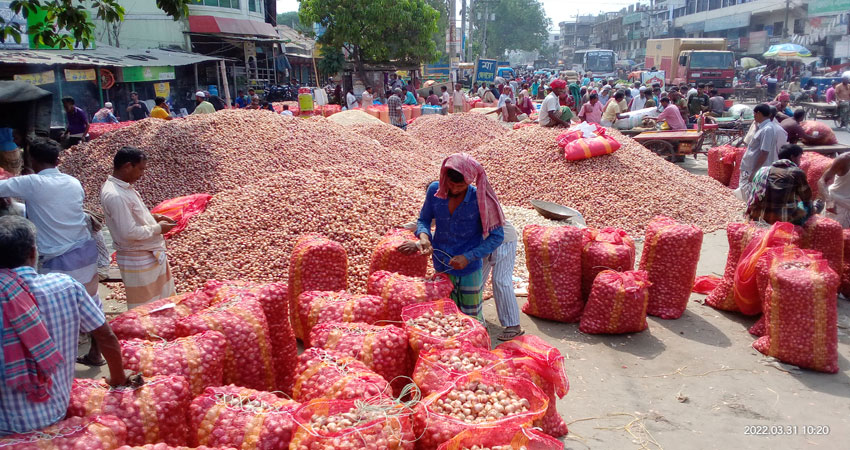Sujanagar, an upazila in Pabna district, Bangladesh, is widely recognized as the “Onion City” due to its vast production of onions, which has become a cornerstone of the region’s agricultural identity. The upazila’s contribution to Bangladesh’s onion market is immense, and its success story in agriculture provides both opportunities and challenges. This report delves deeper into the agricultural significance of Sujanagar, examining the economic impact, the challenges faced by onion farmers, and future prospects for the region.
1. Agricultural Significance of Sujanagar
Sujanagar is located in the fertile region of northern Bangladesh, which benefits from seasonal monsoon rains and well-irrigated lands. The geographical advantage of the upazila allows for large-scale onion cultivation, which has become the primary crop in the area. As a result, the region’s economy has evolved to be heavily reliant on onion production, making it a crucial contributor to the national supply of onions.
The area covers thousands of acres of land dedicated to onion farming, and Sujanagar’s onion production contributes significantly to both local and national food markets. It is estimated that the upazila produces several thousand metric tons of onions annually, making it one of the leading onion-producing regions in Bangladesh. Local markets in Pabna and other surrounding districts rely heavily on Sujanagar’s harvest to meet consumer demand.
2. Economic Impact on Local Communities
The economic impact of onion farming in Sujanagar is profound. Onion cultivation supports the livelihoods of thousands of farmers, laborers, and small traders. The cultivation cycle provides work for farm workers during planting and harvesting seasons, and the trade of onions sustains numerous vendors and traders in local markets. With its strategic location, Sujanagar serves as a critical distribution center for onions, both within the country and to neighboring countries, particularly India.
Furthermore, the success of onion farming in Sujanagar has catalyzed the growth of ancillary industries, such as transportation, packaging, and retail. The local economy depends on a thriving onion trade, with family-run businesses relying on consistent harvests to sustain their income.
3. Challenges in Onion Farming
Despite the success of onion farming in Sujanagar, several challenges threaten the stability and growth of the sector. Some of the most pressing issues include:
- Climate Change and Weather Uncertainty: Unpredictable weather patterns, such as irregular rainfall and extreme temperatures, have caused crop damage and reduced yields. This not only affects local supply but also leads to fluctuations in market prices.
- Pests and Diseases: Onion crops are vulnerable to a range of pests and diseases, such as thrips and fungal infections. These can significantly damage the crops and reduce their marketability, leading to losses for farmers.
- Price Volatility: The price of onions can vary drastically from season to season, often influenced by factors beyond the farmers’ control, including supply and demand dynamics, middlemen involvement, and transportation costs. This volatility affects the income of farmers, who may face financial insecurity if the market price drops unexpectedly.
- Water Scarcity: Water management is a growing concern in Sujanagar as a result of both climate change and excessive use of water resources. Onion cultivation requires consistent irrigation, and the scarcity of water has led to difficulties in maintaining adequate yields.
4. Analysis of the Onion Market in Bangladesh
Sujanagar’s onion production holds a strategic position in the broader context of Bangladesh’s onion market. National demand for onions continues to grow, driven by population increases and dietary patterns. However, Bangladesh has experienced supply shortages in some years, causing the price of onions to spike. This has led the government to explore measures to stabilize the market, including the promotion of domestic production, import diversification, and storage infrastructure.
Sujanagar’s dominance in the domestic onion market means that fluctuations in its onion harvests can have a direct impact on the national supply. In some years, the region’s yield has been unable to meet growing demand, resulting in the need for imports from neighboring countries such as India. Price fluctuations often hit low-income households hard, as onions are a staple food in Bangladesh.
5. Future Prospects and Sustainability
The future of onion farming in Sujanagar holds promise, especially if the region can tackle existing challenges and implement sustainable practices. There is a growing interest in developing more resilient agricultural practices, including drought-resistant onion varieties, advanced pest management systems, and better irrigation techniques.
Further investments in cold storage and transportation infrastructure can help reduce post-harvest losses, extending the shelf life of onions and stabilizing supply in times of demand spikes. Additionally, exploring organic farming methods could allow Sujanagar’s onion farmers to tap into niche markets, both locally and internationally, where organic produce is in higher demand.
The government of Bangladesh has already initiated some programs to support farmers with financial assistance, training, and technology to improve production practices. With continued investment in these areas, Sujanagar’s onion farmers could experience a higher degree of stability and profitability.
Conclusion
Sujanagar’s claim as “The Onion City” is a reflection of its deep agricultural heritage and vital role in Bangladesh’s food production system. The success of onion farming in the region is a testament to the hard work and resilience of local farmers. However, addressing the challenges of climate change, pests, price volatility, and water scarcity will be crucial to securing the long-term success of the sector.
With a combination of strategic policy measures, sustainable farming practices, and market diversification, Sujanagar can continue to thrive as the backbone of Bangladesh’s onion industry, providing both food security and economic opportunities for generations to come.
Edited by: Md.Asraful Alam Sagor, University of Dhaka.

